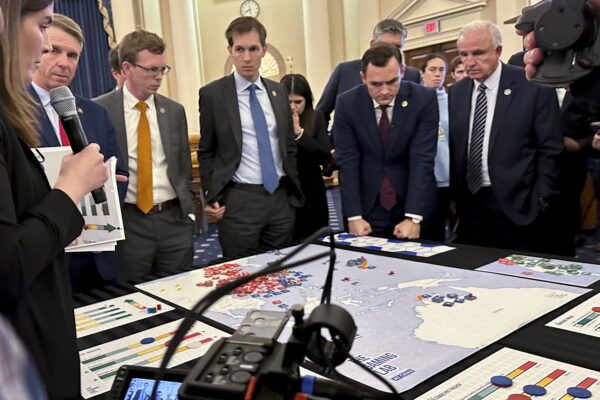English Key to Integrating Taiwanese and US Military Cooperation
Commentary The Taiwan government’s desire for greater integration with the U.S. military is supported by its goal of making the country bilingual by 2030. Taiwan’s President, Tsai Ing-wen told ex-U.S. national security adviser John Bolton, during his visit to Taipei on May 3, that she hopes to increase U.S. security exchanges, in the face of increasing aggression from China. During annual military drills, held in April and May, the Taiwanese military is focusing on opposing a PLA blockade, coordinating with the United States through a “Five Eyes” intelligence link. Increasing integration between Taiwan and the United States both militarily and economically is the key to the continued existence of the democratic island nation. And improving the English language capabilities of the population is a tremendous step towards achieving that goal. As defense and trade ties strengthen, the government is pushing for Taiwan to become bilingual by 2030. Taiwanese and U.S. defense firms are set to resume talks next month regarding co-production of weapons. The Taiwan-U.S. Defense Industry Forum set for May 3 in Taipei will discuss increased collaboration between U.S. and Taiwanese arms makers as well as the future possibility of manufacturing U.S. arms on the island. Beginning on April 6, China ran multi-day military drills near Taiwan simulating capturing the democratic island nation. The exercises were held in response to Taiwan President Tsai Ying-Wen’s visit to the United States. Two weeks later, the United States ran war games simulations of the United States and Japan defending Taiwan from a Chinese invasion. Although the simulation resulted in victory and maintaining an independent Taiwan, U.S. military officials concluded that the United States had to provide Taiwan with more and better weapons. Lawmakers in a new House select committee on China gather for a tabletop war game exercise in the House Ways and Means Committee room in Washington on April 19, 2023. (Ellen Knickmeyer/AP Photo) Beyond strengthening its national security, Taiwan is also increasing its relevance as a global nation by establishing itself as a major technology and trading hub within the U.S. and western sphere. Taiwanese companies are decreasing their China exposure as tensions increase between the United States and China. At the same time, the United States can benefit from having a richer and more heavily armed ally in the Asia-Pacific region. This situation creates an opportunity for Taipei to intensify its economic relations with Washington. As the island’s geopolitical significance grows, it is becoming more essential for the two nations to establish institutionalized economic links which play a part in the U.S. strategy to counterbalance China. Aside from its military and economic development, a major key to Taiwan’s integration with the United States and the West, and perhaps its overall survival, is the ability to speak English. Taking Singapore and Hong Kong as models, having English as the first or second official language has allowed these countries to develop much faster than the rest of Asia and achieve income levels on par with the United States and well above those of other Asian nations or even most of Europe. Malaysia has also benefitted from its high use of English. While not as rich as Singapore, Malaysia is significantly wealthier than other Southeast Asian nations. The Philippines is another example. Again, not one of the richest nations, but the knowledge of English has allowed Filipinos to work abroad and send back remittances crucial to the country’s development. Additionally, English has facilitated the integration of the Philippines’ Armed Forces with the U.S. military, defending the nation from a possible China threat. In 2018, the Executive Yuan, which is the highest administrative branch of government in Taiwan, approved plans to develop Taiwan into a bilingual nation by 2030. This move is seen not only as an attempt to increase economic and security development but also as a shift away from Beijing’s orbit. More than 63 percent of Taiwanese people identify as Taiwanese rather than Chinese. About 31.4 percent see themselves as both Taiwanese and Chinese while only 2.7 percent identify as solely Chinese. The official language of Taiwan is Mandarin Chinese although Taiwan uses traditional Chinese characters which differ from the simplified Chinese characters used in mainland China. The use of traditional characters shows that any connection with mainland China predates the formation of the communist regime in 1949. Another linguistic difference is the use of the Taiwanese language. According to the Ministry of Education, about 64 percent of Taiwanese people spoke Taiwanese as a second language while about 14 percent spoke it as a first language in 2020. Although the Taiwanese language is an important cultural identifier separating Taiwan from China, it is not the official second language of the coun

Commentary
The Taiwan government’s desire for greater integration with the U.S. military is supported by its goal of making the country bilingual by 2030.
Taiwan’s President, Tsai Ing-wen told ex-U.S. national security adviser John Bolton, during his visit to Taipei on May 3, that she hopes to increase U.S. security exchanges, in the face of increasing aggression from China. During annual military drills, held in April and May, the Taiwanese military is focusing on opposing a PLA blockade, coordinating with the United States through a “Five Eyes” intelligence link.
Increasing integration between Taiwan and the United States both militarily and economically is the key to the continued existence of the democratic island nation. And improving the English language capabilities of the population is a tremendous step towards achieving that goal. As defense and trade ties strengthen, the government is pushing for Taiwan to become bilingual by 2030.
Taiwanese and U.S. defense firms are set to resume talks next month regarding co-production of weapons. The Taiwan-U.S. Defense Industry Forum set for May 3 in Taipei will discuss increased collaboration between U.S. and Taiwanese arms makers as well as the future possibility of manufacturing U.S. arms on the island.
Beginning on April 6, China ran multi-day military drills near Taiwan simulating capturing the democratic island nation. The exercises were held in response to Taiwan President Tsai Ying-Wen’s visit to the United States. Two weeks later, the United States ran war games simulations of the United States and Japan defending Taiwan from a Chinese invasion. Although the simulation resulted in victory and maintaining an independent Taiwan, U.S. military officials concluded that the United States had to provide Taiwan with more and better weapons.

Beyond strengthening its national security, Taiwan is also increasing its relevance as a global nation by establishing itself as a major technology and trading hub within the U.S. and western sphere. Taiwanese companies are decreasing their China exposure as tensions increase between the United States and China.
At the same time, the United States can benefit from having a richer and more heavily armed ally in the Asia-Pacific region. This situation creates an opportunity for Taipei to intensify its economic relations with Washington. As the island’s geopolitical significance grows, it is becoming more essential for the two nations to establish institutionalized economic links which play a part in the U.S. strategy to counterbalance China.
Aside from its military and economic development, a major key to Taiwan’s integration with the United States and the West, and perhaps its overall survival, is the ability to speak English. Taking Singapore and Hong Kong as models, having English as the first or second official language has allowed these countries to develop much faster than the rest of Asia and achieve income levels on par with the United States and well above those of other Asian nations or even most of Europe.
Malaysia has also benefitted from its high use of English. While not as rich as Singapore, Malaysia is significantly wealthier than other Southeast Asian nations. The Philippines is another example. Again, not one of the richest nations, but the knowledge of English has allowed Filipinos to work abroad and send back remittances crucial to the country’s development. Additionally, English has facilitated the integration of the Philippines’ Armed Forces with the U.S. military, defending the nation from a possible China threat.
In 2018, the Executive Yuan, which is the highest administrative branch of government in Taiwan, approved plans to develop Taiwan into a bilingual nation by 2030. This move is seen not only as an attempt to increase economic and security development but also as a shift away from Beijing’s orbit. More than 63 percent of Taiwanese people identify as Taiwanese rather than Chinese. About 31.4 percent see themselves as both Taiwanese and Chinese while only 2.7 percent identify as solely Chinese.
The official language of Taiwan is Mandarin Chinese although Taiwan uses traditional Chinese characters which differ from the simplified Chinese characters used in mainland China. The use of traditional characters shows that any connection with mainland China predates the formation of the communist regime in 1949.
Another linguistic difference is the use of the Taiwanese language. According to the Ministry of Education, about 64 percent of Taiwanese people spoke Taiwanese as a second language while about 14 percent spoke it as a first language in 2020.
Although the Taiwanese language is an important cultural identifier separating Taiwan from China, it is not the official second language of the country. And while most of the population embraces the move toward English, there is some internal opposition from those who wish to promote the use of traditional and indigenous languages. It is feared that intensifying English requirements in a curriculum that is already Mandarin-heavy would accelerate the demise of the Taiwanese Hokkien language Hoklo or minor Chinese dialects like Hakka and Mindong. Additionally, there are 16 officially recognized tribes in Taiwan each with their own languages, and most of which are already endangered.
Despite the possible loss of indigenous languages, Taipei is moving forward with its English program. According to the Chief Executive Officer of the European Chamber of Commerce in Taiwan Freddie Hoeglund, English will make the country more attractive to foreign investors and increase Taiwan’s competitiveness in global markets. As foreign supply chains and trade networks become more dependent on Taiwan, diplomatic support for the island will increase.
Views expressed in this article are the opinions of the author and do not necessarily reflect the views of The Epoch Times.












